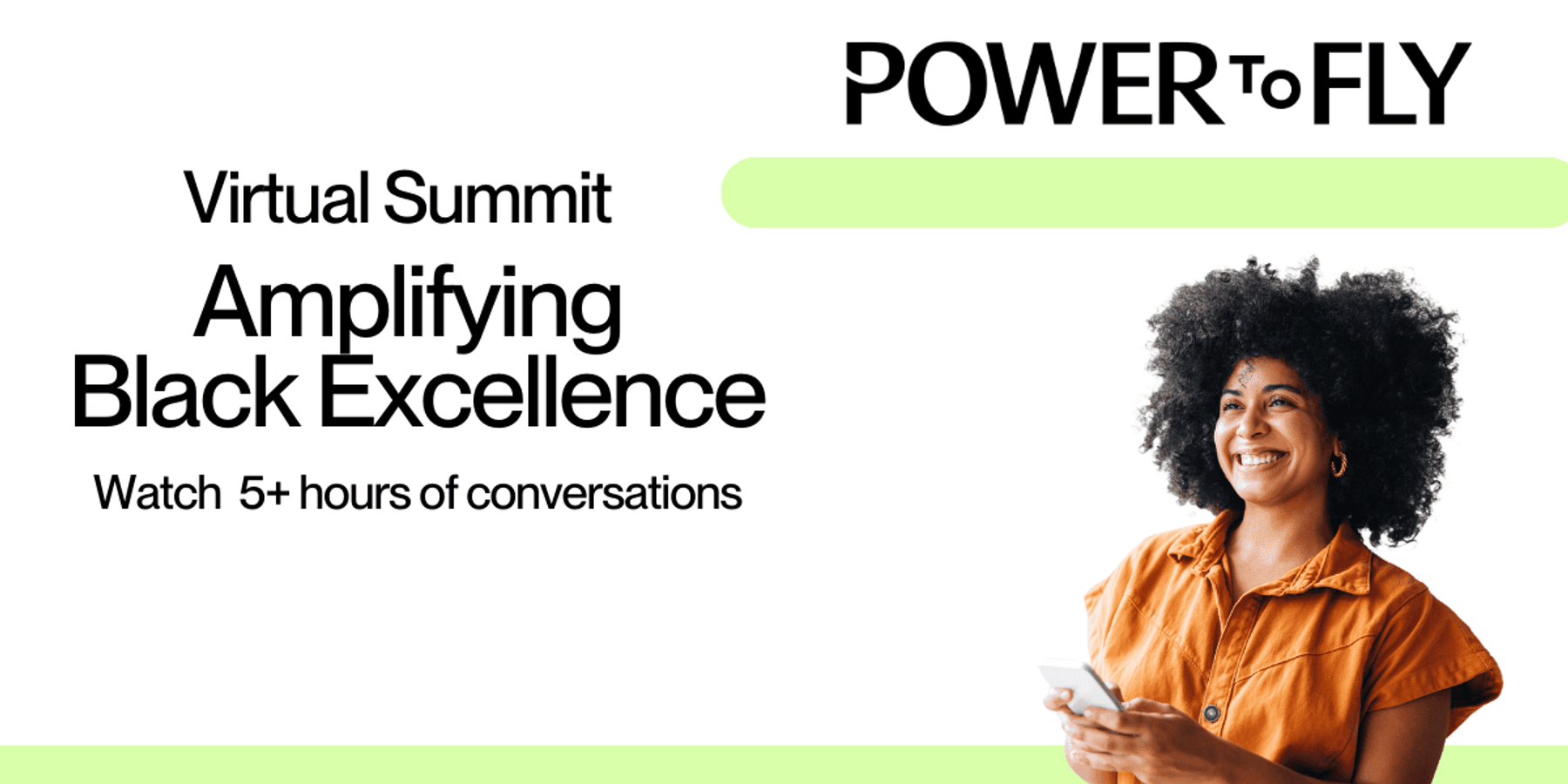When journalist and applied behavioral scientist Elizabeth Weingarten set out to write her debut book, How to Fall in Love with Questions: A New Way to Thrive in Times of Uncertainty, she wasn’t looking to become an expert in navigating ambiguity. She was simply trying to survive it. After leaving a job to pursue a creative endeavor that didn’t pan out, she found herself in an uncomfortable in-between, filled with doubt and a growing sense of purposelessness.
It was during that uncertain chapter that she came across poet Rainer Maria Rilke’s famous advice to “live the questions.” That one idea shifted how she approached not just her career, but her life.
We sat down with Elizabeth to talk about her new book, how she’s learned to navigate uncertainty (without forcing a silver lining), and why sitting with hard questions might be the most powerful thing you can do for your career — and yourself.
PowerToFly: Thank you so much, Elizabeth, for taking the time to chat with us. To start us off, we’d love to hear about your “atypical” career path, as you call it.
Elizabeth:Thanks for the opportunity to share what I learned from my book.
More than anything else, my career has been propelled by curiosity and a steady broadening out of my interests rather than keeping to a narrow path.
I started out thinking that I was going to have a more traditional journalism career; my first couple of jobs were at The Atlantic and Slate. But I realized I had other passions I needed to nurture. The first was in public policy, so I worked for many years at a think tank, developing a policy initiative to do research and journalism on global gender equality issues. Later, I discovered the field of behavioral science and began working at Behavioral Scientist magazine before going to the consultancy ideas42 to do applied research.
A few years ago, I pivoted again into the tech world, where I lead research and thought leadership efforts.
Though I’ve explored many paths throughout my career, all of these moves have been driven by questions like: "Why do we humans do the strange things that we do?", "How can we change our behavior to benefit ourselves and those around us?" and “How, through a deeper understanding of psychology, can we all live more meaningful lives?"
PowerToFly: That’s such a thoughtful way to frame your career — not as a straight line, but as a series of pivots led by curiosity. Those questions you mentioned, especially the ones about living a more meaningful life, are things so many of us ask but don’t always feel comfortable sitting with.
And speaking of sitting with big questions, your book dives deep into this idea of learning to “love the questions,” especially in times of uncertainty. Can you share how that mindset helped you through your own career challenges?
Elizabeth: So, part of what makes uncertainty feel so uncomfortable is that it makes us feel stuck, like we can’t move forward until we have an answer. In fact, my favorite definition of uncertainty is from two psychologists who were writing about how decision-makers conceptualize and cope with it. They defined it as “a sense of doubt that blocks or delays action.”
I wrote this book because I was drowning in uncertainty and felt stuck. I had recently left a job to pursue a creative project, which was failing, and I had no idea what to do next. I felt rudderless and depressed as I applied to jobs and got rejection after rejection.
PowerToFly: Rough. I’m sure so many of our readers can relate.
Elizabeth: Oh, yes. I’m certainly not alone. So, then I stumbled on the poet Rainer Maria Rilke's Letters to a Young Poet, and it challenged my perspective. It’s a book of correspondence between Rilke, a 20th-century Austrian poet, and an aspiring poet named Franz Kappus. Kappus is asking Rilke all kinds of questions about how to be a poet and how to live his life. Rilke famously responds not with answers but by encouraging Kappus to “be patient toward all that is unsolved in your heart and try to love the questions themselves... Live the questions now. Perhaps you will then gradually, without noticing it, live along some distant day into the answer.”
In many ways, I’d never felt further away from loving the questions about my career. They felt like my tormentors. But Rilke’s advice made me curious: How could I start to love those questions? Was that even possible?
That question kicked off the journey I document in the book, where I share insights from science, art, philosophy, history, poetry, and spirituality to investigate that question.
PowerToFly: Yes! That’s beautifully said. So, how have you been able to implement this philosophy in your own life?
Elizabeth: One of the ways this mindset has helped me is by liberating me from the notion that I need to answer some of the big questions about my career quickly, or at all, to continue moving forward. In the book, I compare the types of questions in our lives to parts of a fruit tree. There are questions that ripen quickly into answers — like will I get the job? And questions that you may explore throughout your life, like how do I build a career that gives me a sense of meaning and purpose? These are your heartwood questions; heartwood is the core wood of the tree that gives it its sense of stability and remains throughout its life. You may always be living those questions, and that’s okay.
My book is about how you can continue to live and move forward in your life even when you don’t have all of the answers, using questions as your guide.
PowerToFly: That fruit tree metaphor really stuck with us. And “heartwood questions” — so good.
We also like that you’re not just saying “embrace uncertainty.” How would you describe a healthier way to deal with it, especially around career decisions?
Elizabeth: When I was facing down painful uncertainty in my life, the advice I often found in self-help books was to simply “embrace uncertainty.” To me, this was an unhelpful platitude, in part because it seems to insinuate that we must react positively to uncertainty. But sometimes, uncertainty is painful, awful, scary, stressful. Sometimes, we don’t want to embrace it.
PowerToFly: Totally. That advice can feel kind of dismissive.
Elizabeth: Exactly. That’s why I prefer the idea of “loving the questions.” Just like loving another person, doesn’t mean it has to feel good or be easy all of the time; it just means staying engaged with and committed to the questions even when they’re uncomfortable.
In the book, I share the story of Parker Palmer, who spent years living the question, “What on earth are you doing with your life?” At first, he followed a traditional academic path because it was expected of him, but it left him feeling disconnected from who he really was.
Eventually, his commitment to his questions led him to a new path, one where he became an author, educator and activist who helps others find meaning in their work and lives.
PowerToFly: That Parker Palmer story really hits. So relatable.
One of the other stories that stood out to us was Barbara Schoen’s. Can you share how her experience reshaped your thinking on growth and uncertainty?
Elizabeth: Barbara’s story is very moving. After a car accident left her paralyzed from the waist down, her old identity started to fall away. At first, that was terrifying. But over time, she said it was kind of a relief — like she finally had permission to rethink who she was and what really mattered to her.
It showed me that even big, painful experiences of uncertainty can open up space for new growth.
PowerToFly: Wow. That’s powerful.
Elizabeth: I thought so, too. And I think we can apply that mindset to uncertainty at work, too. Like when there’s a big org restructure or leadership change. It’s easy to panic when you feel like the ground is shifting underneath you.
But you can meet those moments with better questions that give you a sense of freedom and power. Instead of “What does this mean for me?” maybe it’s: “Is there a new role I could explore? Someone new I could learn from? What kind of work do I really want to be doing right now?”
The right questions can open doors instead of shutting them.
PowerToFly: Okay, so let’s say someone’s trying to be smart about their next career move but also wants to stay open to newness. How do you balance those two things?
Elizabeth: I don’t think they have to be at odds. Being strategic doesn’t mean following some strict, linear plan, and being open doesn’t mean saying yes to things that don’t make sense for you.
In the book, I talk about building a “questions practice.” This is a regular habit of checking in with yourself through guided reflection, and in the book I have a map and prompts for readers to use to get started. That practice can help you stay grounded in what you want, even as things change.
PowerToFly: That sounds like a good way to stay focused and flexible.
Elizabeth: Exactly. A question like the one you just asked — “How can I be strategic and open at the same time?” — is a great one to start with. There’s no one-size-fits-all answer, but just coming back to it regularly can help you course-correct when you need to.
It’s less about rigid planning and more about being intentional. Where do you want to go? Does this opportunity help you get there? Are your goals still the same as they were six months ago?
Questions like that keep you aligned with what matters most.
PowerToFly: Last question! If someone finishes your book and walks away with one big mindset shift or new habit, what do you hope it is?
Elizabeth: I’d love for them to see questions as companions, not just tools for getting answers, but something to help you through uncertainty.
We spend so much of our lives trying to find the “right” answers. But in the book, I share research and stories that show how spending more time with the right questions can often be more meaningful and helpful.
PowerToFly: That’s such a refreshing shift.
Elizabeth: There’s this beautiful quote from Joan Sutherland, a Zen teacher I interviewed, that really stayed with me. She said, “A good question will always make the room bigger, or open a door in the room to let something else in, or blow down the walls of the room entirely.”
That’s how I think about it now. Is your question making your world bigger, or smaller?
What your career may demand of you in this moment is not necessarily answers, but bigger and better questions.
Elizabeth Weingarten’s debut book, How to Fall in Love with Questions: A New Way to Thrive in Times of Uncertainty, is out now. It’s a thoughtful, research-backed guide to navigating uncertainty with curiosity — and a must-read for anyone rethinking their career, identity, or purpose. Find it wherever books are sold.




